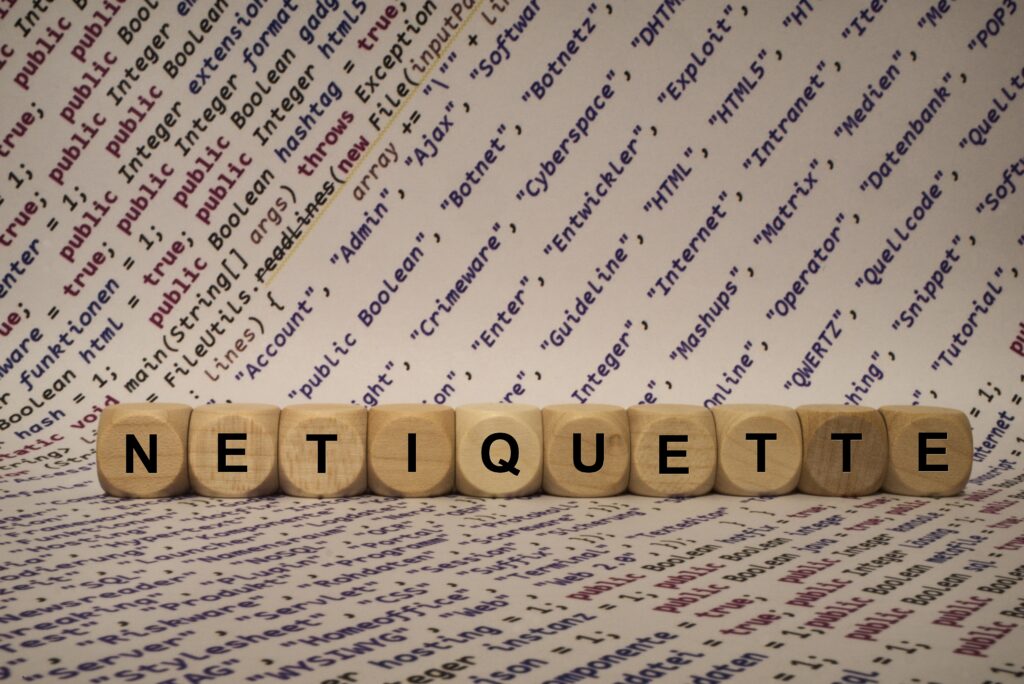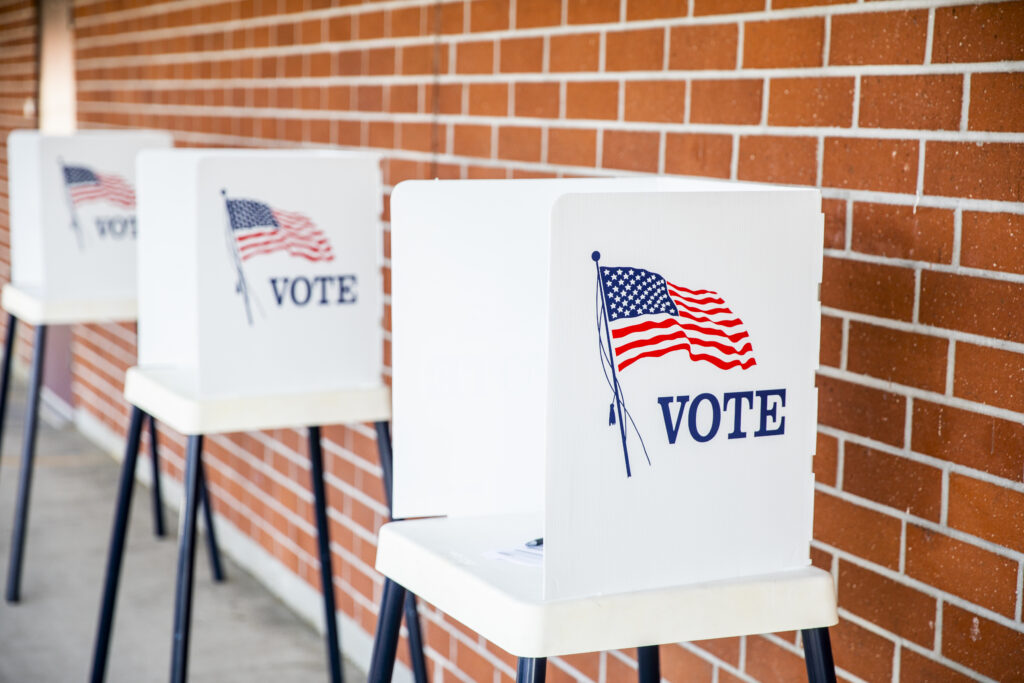Eli Lehrer of The R Street Institute Discusses Artificial Intelligence, Section 230 of The Communications Decency Act, and Elections
This is my second interview with Eli Lehrer, co-founder and President of the R Street Institute. This center-right think tank focuses on what they call “low salience” issues – ones that rarely top the polls when Americans are asked what they care about most. But you’ll increasingly see those same issues on the front page of national and local news, covering everything from artificial intelligence (AI) to fire and flood insurance and the intersection of the Internet and First Amendment. In this interview I ask Eli about his views on AI, Section 230 of the Communications Decency Act, and elections. At the end we also discuss “Dark Money.”

Eli Lehrer, Co-Founder and President of the R Street Institute | R STREET INSTITUTE
Eccles: Every time I turn around, I hear about artificial intelligence (AI). What is this all about?
Lehrer: On the one hand it’s an extremely important development, and on the other hand it is business as usual and the continuation of what has been happening for a long time. Steven Levy wrote a book about Google that deals with events through about 2010. In that book, he refers to Google then as primarily an AI company. We’ve been living with AI for a long time. Online search, ads served on the Internet, even the way our computers search our own files—these are all AI applications. Some of what we’re seeing is just an evolution of what had happened before and what was already happening.
What’s new is that large language models (LLMs) are passing Turing tests. That has been something that has been built up in people’s minds as a key landmark.
Eccles: And what is a Turing test?
Lehrer: It’s when a computer fools you into thinking it is a person. Alan Turing himself wasn’t crazy about the test. It’s an important landmark but it is not the only one.
Eccles: What’s an example of computers seeming more human?

Woman using chatbot in computer and tablet smart intelligence Ai.A.I. Chat with AI Artificial Intelligence, developed by OpenAI generate. Futuristic technology, robot in online system stock photo (Photo: iStock)
Lehrer: The simple fact that you can have a conversation with ChatGPT is a great example. You could show the conversation to someone, and they might believe they are both human.
Eccles: When ChatGPT popped onto the scene, did we arrive at an inflection point?
Lehrer: I think it is an inflection point the same way that running the 4-minute mile was. It’s been built up as an important milestone and because of that it will draw more attention and more money and an even greater rate of accelerated change into this field. The actual fact that LLMs have crossed over to fooling most people most of the time is only an evolutionary change.
Eccles: What’s an LLM?
Lehrer: ChatGPT is an example. It’s basically a program that uses a very big database—like the whole internet—to converse as if it was human.
Eccles: How hard was it to create ChatGPT?
Lehrer: This is out of my field but a big part of it was processing power. Doing this at a certain speed requires significant processing power, and the cost of that has decreased in recent years. You can get a lot of processing power fairly cheaply these days and it makes it easier.
Eccles: Is this the end of education because people won’t have to write anymore?
Lehrer: I doubt it. It will change people’s jobs. Jamie Merisotis, the president of the Lumina Foundation, has this book, “Human Work,” and it points out there are jobs that have evolved enormously but you still have that title and the same types of outcomes. The task a photographer does has changed significantly over the past 20 years—something like 80 percent of the tasks are different—but you still have photographers.

Artificial Intelligence. Concept stock photo (Photo iStock)
Eccles: So what is R Street doing in artificial intelligence?
Lehrer: We remain supporters of permissionless innovation. It’s not like we’re against any type of regulation, ever, on AI. But we want to be very cautious as new technologies develop and much better, we think, to figure out what the externalities are, rather than apply the precautionary principle to technology.
Eccles: What kind of regulations are being thought about?
Lehrer: One example is requiring disclosing the details of algorithms and regulating them to ensure they’re not biased. But if we try to regulate now, there’s a chance that the market leaders will capture regulation and block out others from the marketplace.
Eccles: How would you even stop AI?
Lehrer: Exactly. That’s why we opposed the letter that Elon Musk and others signed urging us to stop AI progress right now. Contrary to other areas, such as medicine, anyone with a little bit of money and a computer can explore AI. This isn’t something that requires enormous resources, and it is quite possible for some problems to be solved by individuals. There’s no way to do a moratorium.
Eccles: These calls for regulation, how much of it is virtue signaling, genuine concerns, or self-interest?
Lehrer: It’s all of the above.
Eccles: How will you know that R Street is successful when it comes to AI?
Lehrer: We aim to continue educating lawmakers about why premature regulation can be so damaging, while also reminding them that AI has to be used for the greater overall benefit of humanity. We write papers, we hold events, we take meetings with policymakers, their staff. and the private sector to discuss policy tradeoffs.
Adam Thierer, is our leading scholar on the issue. He has published a number of papers this year and he regularly spends his time talking with other technology and AI experts and Congressional staff about the principles underlying our work and his research.

Netiquette – cube with letters and words from the computer, software, internet categories, wooden cubes stock photo (Photo iStock)
Eccles: So you’re trying to help shape the narrative and explain to people not to freak out. Let’s pivot to another technology issue that R Street focuses on. Tell me all about Section 230.
Lehrer: Section 230 of the Communications Decency Act is the most important law that defines the Internet. The bulk of the Act was declared unconstitutional but Section 230 is single sentence long: “No provider or user of an interactive computer service shall be treated as the publisher or speaker of any information provided by another information content provider.”
It establishes for the Internet the same type of protections that booksellers had for years: that booksellers could not be sued for selling a book that is libelous, for example, but publishers of the book could be.
Without Section 230, you’d have two extremes: If platforms chose to moderate content in order to keep users safe, platforms would be liable for everything that their users create. In that case, they would be likely to only approve the most benign content for fear of liability and no longer be open forums. The other alternative would be that platforms chose not to moderate in order to avoid liability, so they would allow anything on their platforms and become cesspools. This would result in forums being flooded with all sorts of things ranging from sexually explicit material to bigotry that isn’t desirable.
Some say the government could write regulations about what you can say, or you can’t say, but it is not possible under the Constitution. The fact that Section 230 exists in the U.S., and not elsewhere, is one of the major reasons we have been dominant as the Internet has grown up. France had a computer network in some people’s homes before we had the Internet, but we had the best regulatory system and let the technology evolve naturally. That basic idea has been one of the most important laws that govern the Internet.
Eccles: So how did France get it wrong?
Lehrer: France created a system called Minitel starting in the late 1970s. It became widespread by the 1980s thanks to heavy government subsidies. It was, at the time, far more advanced than anything that was common in the U.S. or elsewhere. In the mid-1980s French people regularly could search telephone directories, send emails, do some shopping, and even access primitive dating boards when such things were very uncommon in the U.S.. The problem was that the heavy subsidies for a primitive, dead-end technology combined with a burdensome regulatory environment that favored dated technology resulted in the French tech sector going into a dead end. While France had a head start and relatively heavy internet usage today, not a single significant consumer facing internet company makes its home there. The global internet companies are basically all American. And that’s largely thanks to Section 230 and the rest of our policies.
Eccles: Explain that connection.
Lehrer: It allowed websites to become a home of user-created content, which made people want to use those services and build those communities. Every platform could establish their own standards and it allows them to build environments that are attractive to advertisers. It also allows competition between platforms to work out what people want. There are other sites that do, and they are available on the Internet broadly. All of this without the government saying explicitly what can or cannot be displayed.
Eccles: So what is the work y’all are doing here?
Lehrer: We’re working to protect Section 230 and we’d like to keep it in its current form. It’s already been chipped away at in an effort to prevent sex trafficking (FOSTA-SESTA) and that obviously is a good cause, but my understanding is that has not been effective and may have made the problem worse. The Government Accountability Office put out a report on it.
I’m concerned it puts us on a slippery slope where sensible-sounding restrictions, if imposed by the government, can eventually be abused.
Eccles: So the theme I’m picking up is this notion of unintended consequences. They tried to make things better, but inadvertently made things worse.
Lehrer: Yes, and it is the same thing with ESG. The efforts to try and control some of these outcomes are very problematic and stand to make things worse.

Voting Booths with no people stock photo (Photo iStock)
Eccles: So for how R Street approaches issues, Section 230 certainly qualifies for low-salience, high complexity. That’s in your sweet spot. But what about R Street’s focus on elections? This seems to be a hot topic growing hotter everyday as more and more candidates enter the Republican primary race!
Lehrer: We don’t focus on election outcomes; we focus on the administration of elections. The mechanics of them, and when it comes to that and voting, we have a few major ideas.
Fundamentally, we think casting a ballot should not be frustrating and we also think it should be easier to talk about voting. We also consider election security important and work with law enforcement, election officials and other groups on that issue.
Then there are issues that come from the extreme wings of the left and right that we disagree with: Like banning mail-in ballots, which is a popular position on the right, and stances on the left about virtually anything proposed being an effort at “voter suppression” even when the measure is modest, sensible, and unlikely to have much of an impact on anyone or actually likely to improve confidence in elections.
We are deeply skeptical of efforts to restrict political speech about elections and limit the ability to talk about voting. A lot of these fall under campaign finance, money as speech being part of it. If you try to limit campaign finance to only small-dollar donations, it is more expensive to raise money and requires people to spend more time raising it. Also, small-dollar donations are probably more conducive to people taking extreme positions on elections. They’re not a magic bullet.
If you allow donations that are relatively large, then that incentivizes people to spend more time with people who can give the maximum, and you end up spending all your time with people who want to give a few thousand dollars. Either way, you’re not really accomplishing what people are claiming to accomplish.
Eccles: Who raises the most money, Democrats or Republicans?
Lehrer: In the 2020 presidential election, Democrats outspent Republicans. It was closer in the 2022 midterms. There are groups who do deep research and tracking on this, the nonpartisan OpenSecrets being the most well-known.
Eccles: So what do you want to see change in election administration?
Lehrer: We did a study with the Bipartisan Policy Center and others about achievable federal election reforms. We ranked and graded states, and some of the information in there will surprise you. The aim was to focus on reforms that would increase durability and confidence in elections, and also the voting experience, while not creating a “federal takeover” and allowing states flexibility. I really recommend people read the report.

One hundred dollars lie on a mirror in the dark close-up black and white photo, money stock photo (Photo: iStock)
Eccles: I keep reading about “Dark Money” and how this is an important tool for Republicans to support their political agenda. What exactly is Dark Money, and do you think this is true about Republicans?
Lehrer: I’m not really an expert on dark money. But it’s a pejorative term for a wide range of spending relating to public policy issues that someone talking about “dark money” doesn’t like. Although a few campaign groups do have pretty rigorous definitions, I don’t think that there’s any all-inclusive definition besides “all political speech not done by campaigns through formal measures that I–whomever is speaking–disagrees with.” It’s often just that the speech in question doesn’t fall under campaign finance laws.
Dark money spending can include things ranging from things that are almost indistinguishable from campaign ads but produced by groups that aren’t coordinated with the campaign–something that generates the spirit if not the letter of some campaign finance laws–to very general things like political books, websites, and educational activities. Since there’s no single fixed definition everyone agrees on, it’s hard to say who uses “more” dark money. By one of the more rigorous definitions used by OpenSecrets, probably the definitive tracker of such things, in 2020, the Democrats used far more than Republicans. So however Republicans used it to achieve their agenda, Democrats used it more. Now, in 2022 the single largest organization that did so was Republican leaning. That isn’t surprising since Republican donors were motivated and had a map that was to their advantage. To me this is just free speech. The right to speak includes the right to speak anonymously and to speak about political issues in all sorts of ways. And it includes what’s pejoratively called “dark money.”
Eccles: Interesting. What about Democrats and dark money?
Lehrer: If you look at everything that anyone has ever called “dark money” then it’s a big advantage for the political left and the Democratic party even in years when the most rigorously defined counts show more Republican spending. Certainly, large parts of the information environment–academia, most newspaper editorial pages, most broadcast media, most major websites–do lean left and if you count that as “dark money” then there’s a massive liberal advantage in dark money. Even though it disadvantages my team, I’m fine with that. It’s free speech. I honestly see nothing seriously wrong with so-called dark money. I’d rather roll back the restrictions currently placed on campaigns so that candidates and party organizations in fundraising so that the people actually running for office have more control over their own messages. This would mitigate whatever negative impacts come from “dark money” without restricting free speech.
Eccles: Thanks. That’s interesting as well. Here’s what this makes me think. If I had to reduce political polarization to two word sound bites on each side, it would be “Dark Money” for the Dems and “Global Elites” for the GOP.
Lehrer: The funny thing, of course, is that Democrats have the most “dark money” by a lot of definitions and, at least until recently, a lot of the most international-oriented businesses were pretty strongly Republican leaning. The latter has changed a good deal in the age of Trump, of course. But there’s more than a little bit of “the pot calling the kettle black.”
Eccles: Thanks again for another interesting interview. I’m looking forward to other ways we can work together since we agree on some things and disagree on others. That always makes life more interesting. Reminds me of my marriage!
SUBSCRIBE TO OUR NEWSLETTER
Subscribe our newsletter to receive the latest news, articles and exclusive podcasts every week

